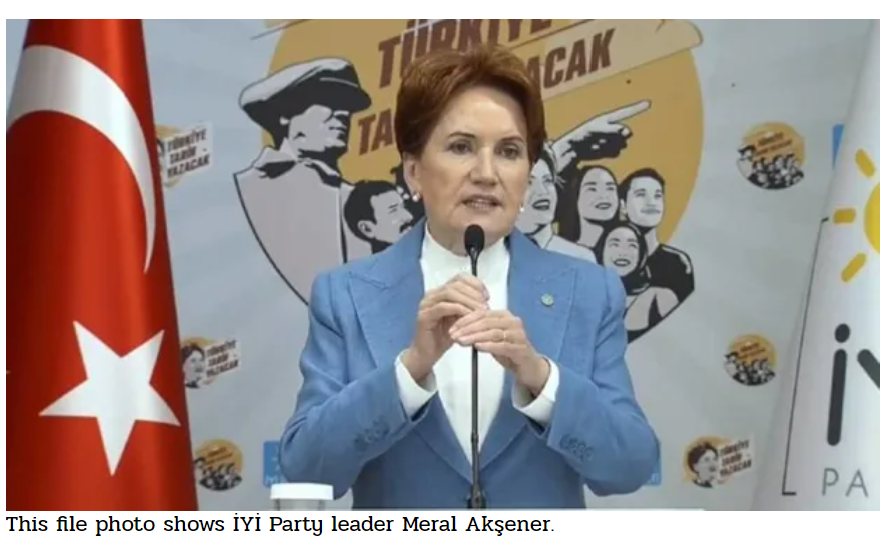İYİ Party has been shaken by a series of resignations in recent days. The wave of resignations that started after May elections has increased in intensity in recent days. Both local organizations and leading figures are leaving the party one by one.
On November 10, former MP Durmuş Yılmaz (also former head of Central Bank) announced his resignation. In the note he sent to the party, Yılmaz stated that the party’s place in the political spectrum was unclear and that it was contaminated before it even came to power.
On the same day, Bahadır Erdem joined the resignation caravan. İYİ Party General Administrative Board Member Erdem emphasized that he found it wrong to end the opposition alliance which defeated AKP-MHP in 2019 local elections. He pointed out the importance of Istanbul and Ankara municipalities remaining in opposition hands for İYİ Party voters. He also praised Ekrem İmamoğlu (Istanbul mayor, CHP) and Mansur Yavaş (Ankara mayor, CHP) for their performances.
It was Adnan Beker’s turn to resign on November 16. Beker, who was elected as a deputy from the İYİ Party for the second time in the last election, did not satisfactorily answer the question of why he resigned. A remarkable development took place on the day Beker resigned. A polling company called people, including journalists to ask: “Would you like to see İYİ Party’s Adnan Beker as the Ankara Metropolitan Municipality candidate?”. Whether Beker has such aspirations will soon become clear. Rumor has it that Beker may join the AKP, just like İsmail Ok and İdris Nebi Hatipoğlu, former IYI Party members of the parliament.
Along with Beker came the resignation of İYİ Party Health Policies Vice President Aylin Anıl Arslan. Arslan also criticized the political line followed by the party after the general elections. She stated her decision to resign was in protest of the current no-alliance policy which bolsters the governing parties’ chances of winning mayoral elections.
Ankara insiders claim that resignations will continue in İYİ Party. The names of Ümit Dikbayır, Uğur Poyraz and Seyithan İzsiz are mentioned behind the scenes among the MPs who will resign. There are also some allegations of corruption. In addition İYİ Party Istanbul Deputy Salim Ensarioğlu, in his post on social media, pointed out that his party has moved away from center-right policies, adding that he was disturbed by the situation. So Ensarioğlu’s resignation will not be a surprise.
The consecutive resignations are a reflection of the identity crisis experienced by the İYİ Party, which entered the political scene 6 years ago. Resignees claim that İYİ Party, which was founded by the dissidents in MHP who objected to the party’s support for Erdogan in 2017 referendum where the presidential system was voted. There is pervasive sense that the party is moving away from its founding principles.
The party is now entering a phase where it will have difficulty consolidating its urban and secular nationalist base, which is opposed to the AKP and generally lives in the coastal regions of the country.
Although there is no measurement of this yet, the reasons put forward by those who resigned from the party are a reflection of the discomfort caused by political meandering. The underlying reason for most of the resignations is that the İYİ Party, which set out with the aim of making Erdoğan lose, and sought votes from the voters to achieve this in the last elections, appears to follow a route that will strengthen the government’s chances of winning in 2024 ballot.
İYİ Party has entered two general elections so far. In both the party failed to make the big leap it was expected of it. The 9.96 percent of votes received in 2018 was followed by 9.69 percent in the 2023 elections. IYI Party was unable to reduce MHP’s vote share below 10 percent in 2018. A below-the-consensus 43 seats were won in the first election and 44 in the second election. Failure to defeat Erdoğan in the Presidential elections in May also thwarted the İYİ Party’s plans to be effective in civil service.
Akşener is now trying to convince the party cadres that no more votes are to be had by the alliance with CHP. Instead, keeping her distance from the CHP and opposing the opposition may be the new growth area.
If İYİ Party wants to grow, it must get votes from the opposite neighborhood. Akşener saw that this option would not be open to her and her party as long as she acted jointly with the CHP, which was assigned the role of “enemy” in Erdoğan’s polarizing political concept.
The problem is that putting distance between IYIP and CHP may not suffice to gain conservative votes, while alienating the centrist-secularist base in coastal cities.
Translated from “Kimlik bunalımı ve büyük kumar” by Berkant Gultekin, Gazette Bir Gün
Follow our English language YouTube videos @ REAL TURKEY: https://www.youtube.com/channel/UCKpFJB4GFiNkhmpVZQ_d9Rg
And content at Twitter: @AtillaEng
Facebook: Real Turkey Channel: https://www.facebook.com/realturkeychannel/
